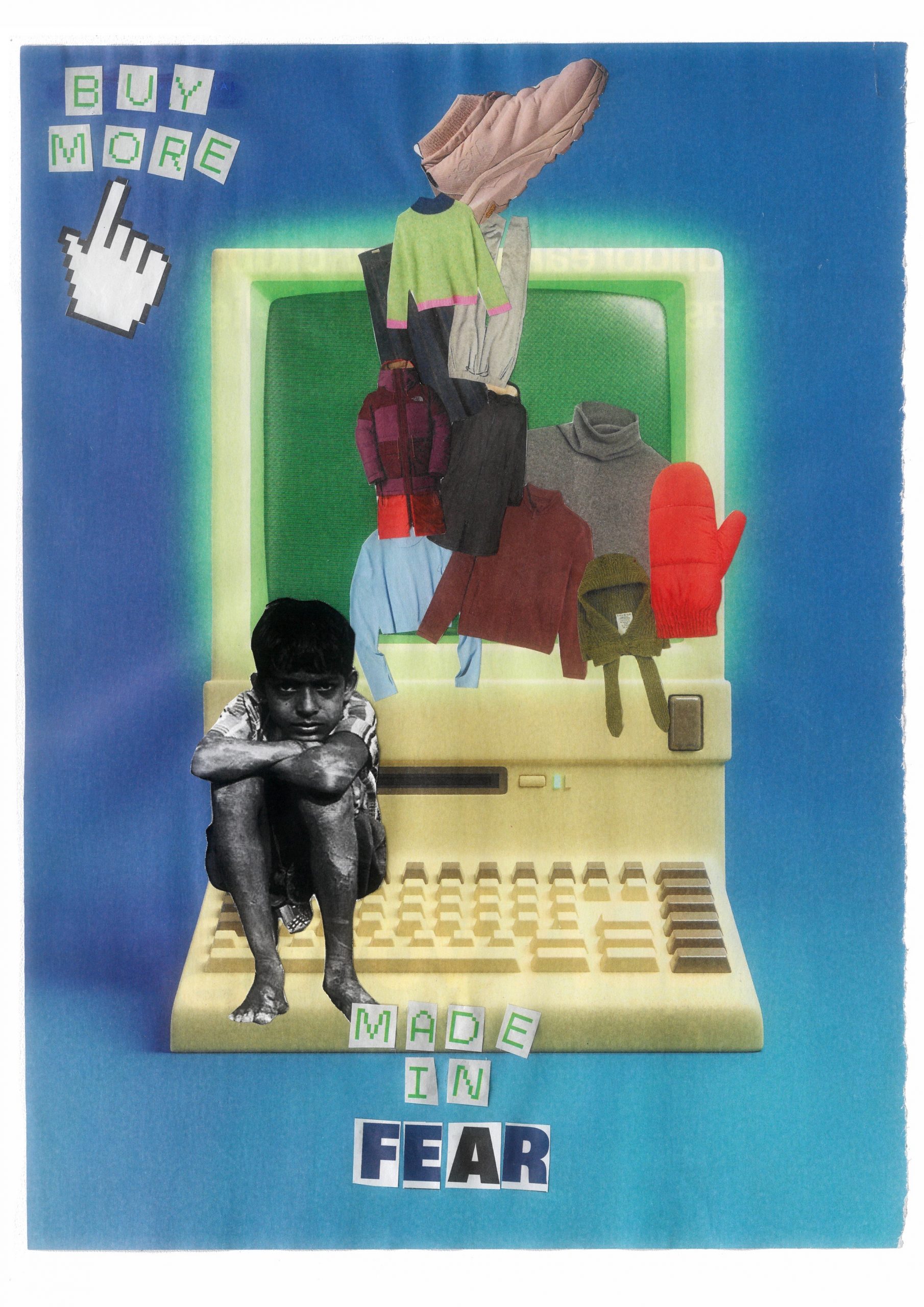Made in Fear: Fashion’s Role in Sustainability, Colonialism, and Resistance


Collage by the author, Rida Shah.
The intersectionality of fashion sustainability, colonialism and the Palestinian struggle for freedom
The bus passes a large billboard, it’s a collaboration between music ‘icon’ Charli XCX and the retail brand H&M. Most people on the bus are sat comfortably knowing their journey ends in a warm bed within their home, but these people they’re not wealthy and they’re not superstars so seeing someone as glamorous as Charli wear something as affordable as H&M means their journey also ends with a parcel for a fur jacket.
Meanwhile, in Dhaka 40,000 garment workers have arbitrary charges forced upon them for protesting their right to a living wage and complicit are brands such as H&M, Puma, Bershkaand more.
November 2023 marked the national wage revision process within Bangladesh during which garment workers peacefully protested the countries poverty wage which also happens to be the lowest minimum wage in the world at 8,000 taka (£58).
Despite the workers calls for a wage that would mean they no longer had to keep themselves and their families in utter states of starvation, workers were repressed and brutalised by the police. 4 died at the hands of this brutality, 131 imprisoned and two years later in 2025 approximately 40,000 still facing charges with only 31 dropped.
All over the colonial world fear is used to supress and intimidate workers yet when we talk about sustainability within fashion this is ignored. Israel like any colonialist, capitalist regime uses outsourcing and subcontracting relationships to entrench a very dangerous power dynamic whereby the person, company or entity being contracted is continuously at the mercy of, those contracting the labour. We see this across the world in the fashion industry, whereby fashion brands are driving down costs but want to increase production numbers.
I talked to Zainab Mahmood, an editor climate crisis magazine It’s Freezing in LA and anactivist within the movement Anti-Sweatshops Activists Against Apartheid, to further discuss how colonialism is the antithesis to environmental justice and how we can collectively create change.
Q: Can you give us a brief overview of how fashion sustainability and Israel’s apartheid regime intersect?
A: “Our view of sustainability in fashion is largely centred around the fair payment and treatment of garment workers who carry the industry on their backs. Israeli garment manufacturers outsource production to Gaza where equally skilled workers are paid significantly less than their counterparts in Israel and take advantage of the high unemployment rate in Gaza, forcing workers to accept any wage or working condition.
“As activists involved in, sustainable fashion who challenge exploitation in the garment sector through a decolonial lens and acknowledge the colonial roots of exploitation and repression of garment workers in the global South, we aim to show how these patterns of coloniality are mirrored in the systematic destruction of the Palestinian garment sector by Israel and the subsequent exploitation of Palestinian garment workers by Israeli manufacturers for cheap labour.”
Q: A lot of individuals aware of the exploitation you’ve described within the global south routinely ask how we can shop sustainably knowing most brands are unethical. What would your advice to them be?
A: “Focusing more on having a sustainable approach to shopping, i.e. buying less, buying high quality, making sure you repair things, only buying things you need and you love, as opposed to choosing or trying to choose the most sustainable brand is the useful place to start. Then ensuring you’re holding brands to account which can make it feel like your part of the change rather than feeling guilty for shopping.’”
Q: Since these systems of oppression are so deeply entrenched, how can we support garment workers and what would you say to those hesitant to engage?
A: “Following organizations like Clean Clothes Campaign, Labour Behind the Label, Remake Our World, and amplifying their campaigns is somewhere to start. We believe that change always happens from the bottom up, and even though we can get excited and feel like we’re doing really great things to push for change, we’re always aware that garment workers have been doing this from the start.
“They are trying to advocate, for their rights, and we just need to amplify what they’re doing. So, you can also once you start following some of those organizations, you’ll also become familiar with other organizations, trade unions, and other campaign groups”
Zainab highlighted the concept of ‘digital activism’ which is low effort and risk for those afraid to begin their journey with in-person protests. It includes directly mailing brands and holding them accountable as well as sharing information through social media to educate others.
Often, we feel as if any form of protest we take is futile but, as Zainab shared, this is not the case for example, during the pandemic remake our world began a petition calling for garment workers to be paid for orders they made that had been cancelled which gained 250,000 signatures. This amounted to $22,000,000,000, being recovered for garment workers. So, pick up your phone or placard and get involved.
By Rida Shah, a student on the BA Magazine Journalism & Publishing course at London College of Communication.

